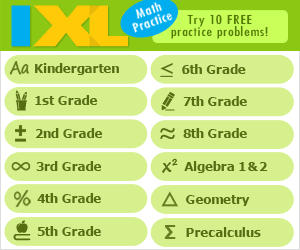6th Grade English Language Arts - Writing Standards
To work on sixth grade writing standards, click on the numbers below to visit pages of internet resources for each of the learning standards.
Checks for Understanding are at the top of this page. Scroll down to find internet resources related to the State Performance Indicators (SPIs).
Checks for Understanding (Formative/Summative Assessment)
0601.3.1 Modes and Genres - Write in a variety of modes and genres, including description, narration, exposition, persuasion, literary response, personal expression, and imaginative. 0601.3.2 Writing Prompt - Practice writing to a prompt within a specified time. 0601.3.3 Work-Related Texts - Create somewhat complicated work-related texts, such as instructions, directions, letters, memos, and reports 0601.3.4 Topics - Develop focused, appropriate, and interesting topics for writing. 0601.3.5 Create Thesis - Create a thesis statement and include relevant facts, details, reasons, and examples that support the thesis. 0601.3.6 Audience Needs - Develop relevant details or reasons in a manner that meets the needs of the audience and purpose. 0601.3.7 Appropriate Structures - Organize writing using structures appropriate for the topic and that meet the needs of the audience (e.g., if using an anecdote to provide an example, use chronological order with sufficient time signals for the reader to follow easily). 0601.3.8 Appropriate Words - Use appropriate and effective words and phrases to indicate the organizational pattern (e.g., problem-solution, with order of steps necessary indicated in the solution). 0601.3.9 Text Features - Use text features (e.g., headings, subheadings, formatting) as appropriate to signal simple relationships between ideas. 0601.3.10 Precise Language - Use accurate and precise language to convey meaning. 0601.3.11 Figurative Language - Use strong verbs and figurative language (e.g., metaphors, similes) for emphasis or creative effect as appropriate to the purpose. 0601.3.12 Vocabulary - Use appropriate vocabulary, sentence structure, and usage to distinguish between formal and informal language. 0601.3.13 Syntactic Variety - Incorporate some variety of syntactic structures for effect when appropriate (e.g., modifying phrases, parenthetical expressions). 0601.3.14 Purpose - Edit to craft a tone that is appropriate for the topic and audience, and supports the purpose. 0601.3.15 Point of View - Use language that conveys the writer's point of view. 0601.3.16 Source Material - When other sources are used or referenced (such as in research, informational essays, or literary essays) adhere to a set of rules 0601.3.17 Note Taking - Generate notes on text, and identify main and supporting ideas. 0601.3.18 Edit - Edit writing for mechanics (punctuation, capitalization), spelling, grammar (e.g., consistent verb tense, noun and pronoun agreement). 0601.3.19 Revise - Drawing on reader's comments, revise papers to focus on topic or thesis, develop ideas, employ transitions, and identify a clear beginning and ending. 0601.3.20 Writing Rubric - Demonstrate confidence in using a Writing Assessment Rubric while evaluating one's own writing and the writing of others. 0601.3.21 Use Technology - Use relatively basic software programs (e.g., Word PowerPoint) to write more challenging texts and create graphics to present ideas visually and in writing. 0601.3.22 Publication - Identify and explore opportunities for publication (e.g., local/national contests, Internet web sites, newspapers, periodicals, school displays). State Performance Indicators
SPI 0601.3.1 Identify Purpose - Identify the purpose for writing (i.e., to inform, to describe, to persuade). SPI 0601.3.2 Audience - Identify the audience for which a text is written. SPI 0601.3.3 Thesis - Select an appropriate thesis statement for a writing sample. SPI 0601.3.4 Logical Order - Rearrange multi-paragraphed work in a logical and coherent order. SPI 0601.3.5 Key Ideas - Select illustrations, descriptions, and/or facts to support key ideas. SPI 0601.3.6 Supporting Sentences - Choose the supporting sentence that best fits the context flow of ideas in a paragraph. SPI 0601.3.7 Flow - Identify sentences irrelevant to a paragraph's theme or flow. SPI 0601.3.8 Transition - Select appropriate time-order or transitional words/phrases to enhance the flow of a writing sample. SPI 0601.3.9 Conclusion - Select an appropriate concluding sentence for a well-developed paragraph. SPI 0601.3.10 Title - Select an appropriate title that reflects the topic of a written selection. SPI 0601.3.11 Graphic Organizer - Complete a graphic organizer (e.g., clustering, listing, mapping, webbing) with information from notes for a writing selection. SPI 0601.3.12 Appropriate Format - Select the most appropriate format for writing a specific work-related text (i.e., instructions, directions, letters, memos, e-mails, reports). Review Help Resources to help review Sixth Grade English Language Arts standards
Search Internet4Classrooms

Custom Search






